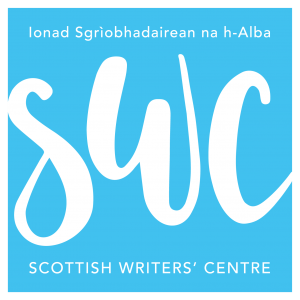Charlie Gracie begins his talk by showing us the notes he’s made for it.
A curious mix of detail and rhapsody, he holds up two sheets on which precise timings lie next to vaguer indications of possible thoughts and suggestive spirals of colour. This, we’ll realise an hour or two later, is an act curiously redolent of both the evening as whole – which is a humble, humorous look at what it’s like being ‘an emergent, rather than an established, poet’ – and the poetry itself, which alternates similarly between complexity and clarity, often finding profundity inhabiting the same space as practicality, and moments of wonder in quotidian surroundings.
These surroundings are frequently the varied landscapes of nature, as reflected in the evening’s title, a line taken from ‘Good Morning’, the eponymous poem from Charlie’s published collection of verse. However, while the careful natural observations that comprise this and many of the other poems Charlie shares over the course of the evening convey a deep and abiding love of nature, their real subjects are more often the response they produced in their speaker, what he brought to them, or how he later wandered more freely in memory having followed with obedient footsteps their literal, linear paths.
The path to publication has always been important for Charlie, but it wasn’t always linear. Though he was first printed at the age of seven in the Sunday Mail (under the wrong name thanks to a printing error) and then again in the Donegal Democrat as ‘a sanctimonious eleven year old’, Charlie’s route to publication as an adult has always been accompanied by setbacks and rejections. With a characteristic effusion, however, Charlie tells us that he treats publication much in the same way that he used to treat the hitchhiking he enjoyed so much – ‘every rejection just brings you one step closer to the lift that will take you where you want to be going’.
Writing will always be part of life of Charlie, no matter where he’s headed. ‘Poetry is like breathing, for me,’ he tells us, and he speaks frequently of the subject with a similar intensity, telling us that while he delivers presentations and talks with ease in the course of his work as a social worker, for him ‘reading my poetry is like spilling my guts’; furthering this later by saying that if the effect of a successful image is like being stabbed, what makes it magic is the twist of the knife – although maybe that’s just his Bailliestone boyhood coming out again.
Aged sixteen Charlie began work as an auxiliary nurse in a hospital in the East End of Glasgow, and a poem he reads about his time there – called ‘Hospital Tea Break’ – finds him recounting the salacious details of his colleagues’ smokefilled break room chatter – ‘You don’t get fucked when you’re over fifty’ – with a similar intensity, but it’s from these moments of unflinchingly observing the imperfections around us that many of the most compelling details of his poetry emerge. From disagreements over stale croissants and snatches of Billie Holliday, to his aged neighbour greeting him in Gaelic or washing her windows in winter, come moments of penetrating insight, seemingly disparate details coalescing into something more lasting, something more able to touch at the eternal.
Despite an interest in eternity, mortality is perhaps the other surrounding in which Charlie’s work most frequently resides, something he attributes not only to the deaths he has experienced in his personal life, but also to his Catholic youth as an altar boy, where he often encountered death and the practicalities that surround it. Death, for Charlie, is intrinsically connected to writing: not only do the bright moments of his poetry take much of their lustre from the proximity of its darkness, he has also personally benefitted from the act of recording them. ‘I couldn’t have dealt with the death of my parents and friends without writing,’ Charlie tells us, and we glimpse again how essential and natural the production of poetry is for him.
That’s not to say it’s always easy however: while some poems occasionally come to him fully formed, jotted unchangingly onto scraps of paper or envelopes after a period of unconscious gestation, it also frequently involves hard work, conscious effort, and craft. Charlie praises writers groups and mentoring wholeheartedly for contributing to his understanding of the latter, but he also shares the kind of personal efforts he still goes to in order to produce his work and get it out there. ‘Good Morning’ was originally published by Sally Evans in a run of 105 metallic hardbacks: hand bound, embossed, and painted. Charlie confesses that he prefers the paperback however, because ‘you could love the hardback without loving the poetry inside’.
Charlie was involved more intimately with the design of the paperback himself, contributing the photograph to its cover, and having a hand in its typography and layout. He has since personally financed a second run of copies – ‘you don’t make money on poetry, but who cares when you’re getting it out there’ – by selling them himself to independent book shops and even once, he admits, cheekily rearranging a display without permission so that his book would have a more central position in its space. These kinds of details – rare insights into the little-discussed practicalities of improving Google listings and selling copies of your own work on the road – shine as brightly as the polished poems he shares, enjoyable as much for the rareness and humanity of these surroundings as the clear beauty of their content.
Charlie concludes the evening with details of the collaborations he has been involved in, from the translation of his poem ‘right’ into Arabic by award-winning Palestinian poet Ghazi Hussein, to the improvised sound and dance piece by electronic quartet the Red Ensemble this inspired, to the project he’s currently involved in with artist Graham Tristram and musician Tom Dalziel. Multi-disciplinary, this new project sees the artists charting points of interest along the road between Glasgow and Callander, examining the human impact on the landscape through a combination of poetry, visual art, and field recordings. The last poem Charlie reads is a product of this project entitled ‘Hut’, describing a ruined munitions store high in the Campsie hills. There may be ‘the smell of pish’ in its corners, but it is also a place, the speaker tells us, where young people come to ‘giggle and snog / and fashion dreams that might not be impossible’.
By the end of the evening, then, after readings of his works, details of their conceptions, and speculation as to their future, this is the sense we ultimately receive: for Charlie, poetry allows a down to earth man to record and celebrate the moments in which he can take his feet off the ground – and float.





